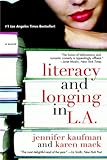February 27
Comments: 7
Review: Tuck Everlasting by Natalie Babbitt
Title: Tuck Everlasting
Author: Natalie Babbitt
ISBN: 978-0-312-36981-1
Story Length: 136 pages
Genre: Children 10+
Is eternal life a blessing or a curse? That is what young Winnie Foster must decide when she discovers a spring on her family’s property whose waters grant immortality. Members of the Tuck family, having drunk from the spring, tell Winnie of their experiences watching life go by and never rowing older.
But then Winnie must decide whether or not to keep Tuck’s secret—and whether or not to join them on their never-ending journey.
Three Quick Points About Tuck Everlasting
- Point 1: Pensive. If I were to sum up this book in one word, that would be it.
- Point 2: Ethereal. If I were to sum up this book in another word, that would be it.
- Point 3: Bittersweet. If I were to sum up this book in one final word, that would be it.
My Thoughts on Tuck Everlasting
(Below are my thoughts on the book. If you want a full run down, you can read the story summary, which includes spoilers.)
I am terribly in love with this book, despite its melancholy.
First, there is the writing itself. On the surface, it looks simple, but there is an elegance in that simplicity. The descriptions are painted with an ethereal quality, quite like a daydream, and it has a steady undercurrent not unlike drifting lazily down a stream.
Next is the characters. Each one seems to have a life outside the pages of this book. Even when I finished reading, I could still imagine these people in miniature size continuing to live out their lives.
Winnie Foster was a bright, curious, and mature young girl, but she was still a little girl who did little girl things. Jesse Tuck was the epitome of impetuous youth, despite 104 years of experience. Miles Tuck was a weathered and pensive man, quite possibly due to his lot in life. Mae Tuck was a jubilant woman who somehow made me smile every few seconds. Angus Tuck was a wise, and sometimes persnickety, man who, more than anything, was ready to leave this world.
And the man in the yellow suit…what can I say about him? It’s been a long while since I remember disliking a character so swiftly as him. A true villain indeed. He was greed incarnate. But I did end up pitying him a bit at the end.
Then there is the story. A young girl tired of her life of confinement sets out on a mission of adventure, and finds exactly that—in an unexpected way. There’s plenty of tension—being held captive in a strange place with strange people; plenty of growth—what it means to truly live; and plenty of learning—what it means to do the right thing.
Finally, the message. There are so many nuanced messages woven in the story, including tolerance, greed, procrastination, choice, but the one recurring theme is that of life and death. Specifically, what does it really mean to live? And when you have immortality bestowed on you, do you continue to live at all?
Some parts of this book made me laugh and some parts choked me up. For instance, there’s a section where Tuck takes Winnie out in the rowboat and lodges it on a fallen tree trunk to illustrate his point:
“It goes on,†Tuck repeated, “to the ocean. But this rowboat now, it’s stuck. If we didn’t move it out ourself, it would stay here forever, trying to get loose, but stuck. That’s what us Tucks are, Winnie. Stuck so’s we can’t move on. We ain’t part of the wheel no more. Dropped off, Winnie. Left behind. And everywhere around us, things is moving and growing and changing. You, for instance. A child now, but someday a woman. And after that, moving on to make room for the new children.â€
Winnie blinked, and all at once her mind was drowned with understanding of what he was saying. For she—yes, even she—would go out of the world willy-nilly someday. Just go out, like the flame of a candle, and no use protesting. It was a certainty. She would try very hard not to think of it, but sometimes, as now, it would be forced upon her. She raged against it, helpless and insulted, and blurted at last, “I don’t want to die.â€
“No,†said Tuck calmly. “Not now. Your time’s not now. But dying’s part of the wheel, right there next to being born. You can’t pick out the pieces you like and leave the rest. Being part of the whole thing, that’s the blessing. But it’s passing us by, us Tucks. Living’s heavy work, but off to one side, the way we are, it’s useless, too. It don’t make sense. If I knowed how to climb back on the wheel, I’d do it in a minute. You can’t have living without dying. So you can’t call it living, what we got. We just are, we just be, like rocks beside the road.†–pg 63-4
That was the moment that my heart broke for the Tucks. That was the moment I finally drank in all that it meant for them to live forever because forever is a long time to watch the world drift by.
But ultimately, the lesson is: life is what you make of it, regardless of how long you’re given.
This is a book I wish I’d read as a child, and it’s a book I will certainly read again, multiple times (and to my future children). A beautiful story, though bittersweet.
Rating: Required Reading [A] (?)







